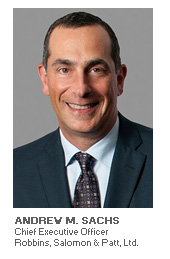
While most attorneys work for multiple law firms over their careers, Andrew M. Sachs of Robbins, Salomon & Patt, Ltd. (RSP) has had a long and interesting career at a single firm, a testament to his hard work, putting client needs first and treating colleagues, clients and peers with mutual respect. Sachs secured a summer legal internship with RSP and was offered an associate position after graduating law school. He began building a successful commercial real estate and finance practice, moved on to the senior management track, and was recently promoted to Chief Executive Officer.
ABL Advisor met with Sachs to learn more about his career serving the commercial finance industry and his outlook for RSP as the CEO of the firm.
ABL Advisor: Why did you choose law as a profession?
Andrew Sachs: Growing up, I was engrained with the importance of using common sense and thinking before acting. I knew a career in law would enable me to use those skills. Even when I was younger, I had good business judgment and instincts, and I was known for being someone who people felt they could come to for guidance and support. I enjoy putting those skills to work for my clients.
ABL Advisor:What initially attracted you to RSP and has kept you there for your entire career?

Sachs: What genuinely attracted me to RSP is the people. I sensed a true connection with the lawyers I met when I interviewed for a summer internship in my second year of law school. When they later offered me a job as an associate, I accepted because it felt like home to me. One of the advantages of practicing at a smaller firm is that I had the opportunity to work on a wide variety of complex client matters at an early point in my career. I was mentored by senior lawyers who supported and encouraged me to build a practice and helped me hone my professional skills and pursue a management track. They taught me the value of a strong mentoring program, which I continue to pay forward. Young lawyers who are actively brought along by senior attorneys tend to progress more rapidly and develop ongoing partner relationships, which gives them access to additional insight, guidance and support throughout the associate’s career. Additional factors that attracted me to the firm were its positive, collegial culture; talented lawyers; and first-rate staff. Many of us have been together most or all of our careers. I wouldn’t have stayed if I wasn’t working with skilled attorneys and a great organization.
ABL Advisor: What influenced you to specialize as an asset-based lending and commercial finance attorney?
Sachs: My mentors involved me in a wide range of matters in our Banking & Finance and Business Transaction practice areas and provided introductions. Their mentoring and the experience I gained along the way helped me develop a reputation as a skilled lending attorney. As a young attorney, I worked on real estate loan transactions, including commercial and industrial loans, and I was eventually introduced to asset-based lending. I really enjoyed getting client transactions to the finish line and I developed an expertise in asset-based lending which became a significant part of my practice. Once an attorney has that niche designation, relationships and contacts grow and develop, and the referral network flows.
ABL Advisor: What prompted you to choose a management track and what would you advise other attorneys seeking the same?
Sachs: It is important for law students and recent law firm hires to learn the business side of law and develop the skills required to build a successful practice, which is why more law schools are incorporating MBA-style studies into their curriculum. Attorneys who are practice-ready graduates versed in marketing, business development and communication skills will have a competitive advantage over their peers. In my experience, the attorneys who ran our firm were my mentors and I wanted to follow in their footsteps. I respected their career paths and their leadership. The advice I would offer is that the most important thing is to listen, then listen some more. In my first year of attending management meetings, I primarily sat back with my eyes and ears open. The more meetings I attended, the more I realized what I didn’t yet know. It’s important to be confident but not arrogant. You have to learn to compromise, understand that reasonable minds can differ and learn to really trust your partners.
ABL Advisor: What skills have you learned that have helped you advance?
Sachs: I have developed strong listening skills, a key element for a successful practice. Lawyers who are powerful listeners can negotiate more effectively, answer questions more responsively, communicate with clients more completely and generally improve their effectiveness in almost all aspects of their practice. In addition, I’ve learned what matters and what doesn't. When I was a young lawyer, I wanted to win every point and every negotiation, but now I have a completely different mindset. Now I know that I can advocate for my client’s desired results and goals, and, at the same time, protect my client’s interests. I’ve learned when I should push and when not to. I’ve learned that common sense and good business judgment are what clients usually need and want. No question, we have to know all the technical aspects of the law, but most of the time in my role as trusted advisor, clients want solid, practical advice. To become that trusted advisor, you must learn how to give your client perspective, both the upside and downside of any situation.
ABL Advisor: What changes and achievements has RSP seen over these last 10 years with you as COO?
Sachs: We have significantly grown the breadth of our practice and expanded into other areas to become a full-service firm. For example, we have developed strong practices in the areas of disability rights, factoring and construction litigation to supplement our core lending, real estate, corporate, transactional, commercial litigation, estate planning, tax and municipal practices. We have also made a greater investment in marketing, which has helped us strengthen our identity and brand as a mid-size law firm in Chicago – there are not many of our size left and I’m really proud of our longevity. We have successfully transitioned practices from one generation to the next where other firms may have aged out. But the biggest change is we’ve grown the firm to 40 lawyers.
ABL Advisor: How will your role as CEO be different than as COO?
Sachs: I’ve been managing the day-to-day activities of our firm for many years and I am fortunate that we already have a strong, effective management team. I will continue to consult with our management committee members and make decisions using a collaborative approach. My focus will likely shift some from the internal to the external, from “doing” to communicating and leading. I will be more at the forefront of our strategic planning and development of client relationships. It’s an honor to be named CEO, but all members of our management team support our firm every day and they are no less important to the success of RSP. On a lighter note, I will need to get used to being the one who gives the ceremonial speeches and toasts.
ABL Advisor: What are your most important lessons learned that you will take to your CEO role?
Sachs: The biggest lesson is that nobody, myself included, ever stops learning, and you’re not right just because you have a title and a position. You may get the benefit of the doubt, but you have to keep earning trust and respect as you go. During the pandemic, for example, I learned to be flexible as we faced a sudden disruption to how our employees work. I am proud of how quickly our firm adapted and successfully navigated the challenges together. I am committed to remaining agile as a firm, and staying grounded personally, continuing to learn and listen and respect the opinions of others so I can continue to grow as a leader. I also want to work on being more approachable for staff and young lawyers. People can be intimidated by a title, but it is important to make sure employees know that I am accessible and have an open-door policy.
ABL Advisor: What are your goals for RSP, both immediately and five years from now?
Sachs: My first goal is making sure we transition practices from the most senior lawyers who are nearing retirement and ensuring that business stays with our firm. Developing talent is at the top of my agenda as well and we want to bring more diverse individuals into firm management roles and close the gender gap. Many new CEOs talk about a change agenda, but RSP has built a successful formula of long-term relationships and providing practical, actionable advice, and I will continue to build on that. We’ll continue to position the firm for healthy future growth and look for lateral opportunities to grow our firm and expand our client base.
ABL Advisor: What do you feel is appealing about RSP to a client and to a new attorney?
Sachs: For clients, we have a broad range of practice areas to provide the full range of services. If you hire RSP, you get an appropriately staffed team of talented attorneys to handle your matters. We offer strong business judgment and we work hard to earn our clients’ business. So many of our clients are long-term relationships because we invest the time to understand their business and goals and develop a trusted advisor relationship. The same goes for employees – we invest in our staff and form lasting relationships. We do not have much turnover. We have a laid-back, open-door culture, and individuals like working at RSP: When an attorney joins RSP it is very often the last stop they make in their careers.
ABL Advisor: What are your thoughts on challenges ahead for the ABL market?
Sachs: A lot of the asset-based lending work I do is with non-bank owned commercial finance companies and alternative lenders. Economic uncertainty due to the pandemic has reduced risk appetite. As we move further into 2021, my impression is that bank credit will remain conservative so that could open deal opportunities for private lenders. Businesses need partners who can remain agile and support their changing needs. With additional government stimulus programs in 2021, there will continue to be external factors that disrupt traditional lenders, so non-bank lenders should make sure they are ready to invest in the market as opportunities arise. I’m predicting a bullish market in 2021 for my ABL clients.